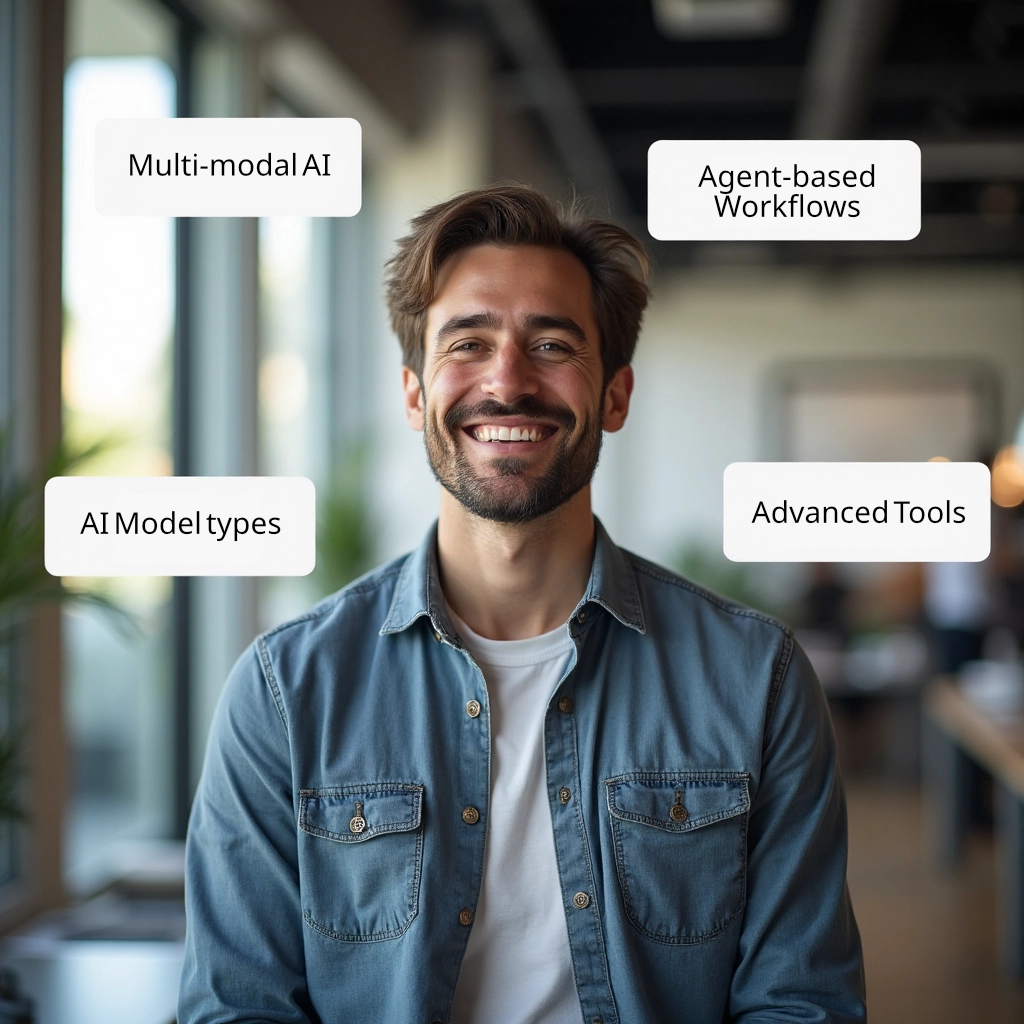Generative AI Workshops: Your Fast Track to Future-Proofing Your Career
Generative AI workshops offer immersive, hands-on training to help you and your team master essential AI skills, adapt to rapid workforce changes, and unlock new opportunities.

Why Generative AI Workshops Matter
The Urgency of Generative AI Skills—Now, Not Later
Generative AI is changing the way people work. It is reshaping how tasks get done, how jobs are organized, and which skills have value in today’s workforce. Deloitte’s research shows that when companies use generative AI in daily work, they do more than increase productivity and spark new ideas. They also change what they expect from their employees. Skills like emotional intelligence, strong critical thinking, and flexible problem-solving are becoming more valuable as AI supports and extends technical abilities.
Workshops: The Fastest Path to Real Competence
A Generative AI workshop gives you a place to put theory into practice. Unlike self-paced online classes, workshops let you work through real-life problems and collaborate with others. This hands-on approach helps you build technical skills and the confidence to try new things, adapt to changes, and guide AI projects at work. Studies from Dataquest and Deloitte show that people who take part in active, project-based AI training do better than those who only learn by watching or reading.
My Journey: From Theory to Workflow Leadership
When I moved from studying AI theory to leading live workshops, I noticed a big difference right away. Running a Generative AI workshop showed me how much people learn from doing things together. Instead of just hearing about concepts, participants built workflows, checked AI results, and solved tough problems as a team. This way of learning not only helped fill important skill gaps but also created a group that was curious and ready to handle change.
Why Every Professional Needs to Act
Companies already organize work differently and want their teams to know more about AI. Waiting to learn these skills later is not a good strategy. When you join high-impact Generative AI workshops, you prepare yourself and your organization to work well in a world powered by AI.

Generative AI is Reshaping Every Industry
Unleashing New Ways of Working Across Sectors
Generative AI is quickly changing how businesses operate. It brings new abilities that go beyond simple automation, reaching into areas like creativity, decision-making, and innovation. Deloitte’s AI Institute reports that businesses in every major industry—such as consumer goods, energy, finance, government, healthcare, and technology—now use generative AI to increase efficiency, scale operations, and handle more complex tasks. For example, in finance, AI detects fraud and manages client communication. In healthcare, AI speeds up drug discovery and tailors patient care to individual needs. Manufacturing companies use AI to improve supply chain management and predict when equipment needs maintenance. Each industry now experiences visible changes, with generative AI improving workflow, productivity, and how companies use their resources.
Scientific Data: The Scale of Industry Impact
Deloitte’s research shows that more organizations are using generative AI, and they report strong returns on investment. Companies see lower costs, faster product development, and better experiences for their customers. Dataquest highlights this same trend, referencing a McKinsey report that predicts a 23% rise in demand for STEM (science, technology, engineering, and mathematics) jobs by 2030. This increase connects directly to how generative AI gets used in business processes. The World Economic Forum also estimates that by 2030, 70% of the skills needed for most jobs will change. This means workers and companies need to focus on learning and updating skills in generative AI technologies.
Expert Perspective: Auditing the Transformation
From my experience auditing AI systems and designing workflows, I notice the biggest change is in what organizations now expect from their teams. Generative AI is becoming a basic skill. Companies expect you to use AI to automate routine tasks, find insights in complex data, and work together with AI to create content. Companies that do not keep up with AI adoption already face challenges in innovation, keeping top talent, and staying flexible in their operations.
AI as a Workforce Development Imperative
More workforce development programs now include generative AI, which marks a major change. Dataquest and Deloitte both point out that demand for people who understand AI is growing faster than the supply. Many industries now build custom AI models for their specific needs. Training programs and hands-on workshops help workers gain the practical skills needed to use generative AI in workflow design, productivity, and making smart decisions.
Key Takeaway
Generative AI is already changing every industry and shaping what it means to compete and create in today’s workforce. If you want to succeed in this new era, you need to learn these technologies through structured lessons and real-world practice. This approach will help you and your organization work effectively in a world powered by AI.
Practical Skills and Competitive Edge from Workshops
Hands-On Learning Drives Real-World AI Skills
Workshops in generative AI give you an immersive and practical way to build real-world skills. When you join these workshops, you learn faster and more effectively than from self-paced online courses or just reading theory. Multiple studies—including research in the Educational Technology Journal and ScienceDirect—show that hands-on activities like scenario-based projects, guided tool use, and solving problems together help you understand concepts deeply and remember them longer (ScienceDirect, 2023). In these structured workshops, you work directly with AI tools and real datasets. This approach lets you apply what you learn right away to tasks such as automating workflows, generating content, or analyzing data.
Peer Learning and Scenario-Based Training Increase Retention
Workshops use group projects and real-life scenarios to support peer learning. Research from the Educational Technology Journal (2024) finds that working in teams on AI projects and taking part in interactive exercises improves your engagement and helps you retain knowledge. You will learn how to troubleshoot issues, refine your AI workflows, and improve them in a supportive group. This process builds your technical skills, strengthens your communication, and develops your ability to work well in a team. Chris, a workflow designer and trainer, shares that these hands-on sessions help professionals face actual business problems, handle uncertainty, and grow more confident in using generative AI tools.
Competitive Edge Through Immediate Application
If you or your organization invest in AI workshops, you gain a real advantage. Deloitte’s research (2023) shows that employers increasingly look for candidates with hands-on AI experience rather than only theoretical knowledge. People who complete workshops stand out because they can use the latest AI tools, know how to fit AI into different workflows, and can quickly adapt to new technology. Common workshop projects include automating repetitive tasks, improving productivity with AI-generated content, and using data to find useful trends or insights.
AI Training Benefits: Beyond Technical Skills
Generative AI workshops help you learn more than just technical abilities. You also develop ways to think critically about using AI responsibly, learn to keep your work transparent and traceable, and focus on constant improvement. As companies shift to AI-powered operations, they need teams who can innovate and stay accountable. These hands-on sessions prepare you to move from traditional roles into new opportunities where AI is a core part of the work. You gain the skills to lead projects, adapt to changes, and succeed in a workplace shaped by AI.

Preparing for the Evolving Workplace and Closing Skill Gaps
The Growing Demand for AI Skills in Modern Organizations
AI skills have become essential for professionals as automation and AI adoption quickly change job requirements across many industries. Research from IBM and Reuters shows that spending on AI-related projects will reach over $550 billion in 2024. Despite this growth, companies expect a 50% gap between the demand for AI talent and the available workforce. According to a 2024 survey cited by InformationWeek, 81% of IT professionals believe they can use AI, but only 12% have real-world experience with these tools. In addition, 70% of workers will need to significantly upgrade their skills to stay competitive in their current or future jobs.
Identifying and Addressing Skill Gaps
Skill gaps now rank among the main concerns for business leaders. Reports from Deloitte and other industry sources show that shortages in AI skills are one of the top three risks for businesses. Sixty percent of IT decision makers say that AI is where their company faces the biggest skills shortage. These skill gaps go beyond building AI systems. They include abilities such as reading and working with data, creating effective prompts for AI models, understanding ethical issues, and blending AI into daily workflows.
When organizations conduct skills audits, they often find two main weaknesses. First, many employees lack experience using generative AI tools. Second, workers often do not know how to fit AI into their current job tasks. Chris, who designs workflows, has seen traditional roles like marketing, HR, and finance change to require basic AI skills. Employees now need to review AI-generated results, work alongside automated systems, and oversee AI-based processes.
Bridging the Divide: The Role of Workshops in Upskilling
Generative AI workshops offer a practical way to close these skill gaps. Unlike traditional training, workshops place you in realistic situations where you use AI tools, such as large language models, generative design programs, and workflow automation software. This hands-on learning helps you build skills quickly, increases your confidence, and lets you understand AI concepts through active practice.
By using information from organizational audits, you can design custom workshop programs for individuals and teams. For instance, a finance team can learn to automate reports and spot unusual data patterns with AI. HR professionals can develop skills in AI-based talent analysis and learn about responsible use of automated decision-making. These focused workshops help teams fix skill gaps in ways that improve productivity and support the organization’s ability to adapt.
AI Skills for Professionals: A Core Requirement for Future-Readiness
Professionals now need AI skills to succeed in today’s changing workplaces. Studies show that organizations that provide hands-on AI training adjust better to new technology and keep a competitive edge. Generative AI workshops help you move from traditional roles into AI-enhanced positions, and they encourage ongoing learning at work.
When you develop the ability to use, review, and update AI technology, you help your organization prepare for fast changes in the digital world. The strongest organizations treat AI skills as a basic part of their workforce plans and act early to address gaps before they grow.
AI TRAINING WITH CHRIS
Generative AI’s Impact on Learning & Development (L&D) and Productivity
Personalization and Adaptive Learning at Scale
AI is changing the way organizations train and develop their employees. Generative AI creates personalized learning experiences by analyzing each employee’s performance, skills, and preferences. With this information, AI systems build learning paths that fit individual needs. AI-driven Learning Management Systems (LMS) and Learning Experience Platforms (LXP) update training content as employees learn, making sure each person works with material that matches their job and current skill level. This targeted method increases engagement, helps people remember information, and improves training results for many different groups.
Automated Content Creation and Rapid Course Deployment
Generative AI helps automate the process of creating training materials. This reduces the time and effort needed to design and update courses. AI can make eLearning modules, interactive quizzes, scenario-based simulations, and real-time feedback tools. By using automation, organizations can quickly share new training materials and keep content up to date with industry changes and compliance needs. Large organizations benefit from high-quality learning resources that are easy to scale and adjust as needed.
Real-Time Feedback and Continuous Assessment
AI-powered platforms use advanced language processing and adaptive algorithms to give instant, helpful feedback on quizzes, simulations, and skill demonstrations. Learners get clear advice about their progress and suggestions for what to work on next. Managers can see detailed data on employee skills. This immediate information helps organizations spot skill gaps and provide support where it is needed, encouraging ongoing professional growth.
Measurable Productivity Gains
Studies from scientific and industry sources show that using AI in learning and development increases productivity. A 2023 McKinsey report says that companies with AI-powered L&D programs saw up to a 30% rise in workforce productivity. Research from Deloitte shows that these companies also have lower dropout rates, better employee retention, and faster skill building. Personalizing learning, automating simple tasks, and giving instant feedback make teams more efficient and capable.
Workflow Design for Scalable, Auditable Learning Environments
AI in L&D makes it possible to design training systems that are scalable, easy to audit, and effective. AI tracks how learners interact with material, their assessment results, and their progress. This creates clear records that support compliance and ongoing improvement. L&D managers can use this data to adjust programs based on real results, making sure training matches organizational goals.
Organizational Benefits and Future-Readiness
When organizations use generative AI in learning and development, they gain several advantages. These include faster skill development, more engaged employees, and the ability to adapt to new business challenges. Gartner predicts that by 2027, over 80% of companies will use AI learning tools for skill development. Companies that adopt AI early already see benefits like better employee engagement, lower training costs, and higher productivity. Using AI-powered learning helps organizations prepare their workforce for future changes and supports continued growth in an AI-focused economy.
References: Training Journal (2025), LinkedIn Pulse (2025), McKinsey (2023), Deloitte Insights, Gartner (2024).
Real-World Workforce Development and Market Opportunities
Generative AI’s Integration into Workforce Development Programs
Workforce development organizations now use generative AI to improve how jobseekers find and prepare for jobs. Jobs for the Future (JFF) reports that generative AI supports many workforce activities. You can use AI for career exploration, skill validation, real-time coaching, and job application support. Tools such as AI-powered resume builders, interview simulators, and job matching platforms have become common in public workforce agencies and training providers. These tools make the job search process smoother and help more people access career opportunities, including those returning to work or changing careers.
At work, generative AI helps staff by automating routine tasks. For example, you can use AI to transcribe meetings, complete compliance reports, and write grant applications. This automation gives staff more time to focus on supporting jobseekers one-on-one. As AI-powered tools appear, they create new market spaces for specialized services. Examples include tools for verifying skills and platforms that match mentors with mentees. These developments open more paths for career growth.
Expanding Market Demand and New Job Roles
Generative AI changes the types of jobs employers need. Deloitte’s research shows that while automation may change some job duties, it also creates new roles and increases demand for workers in AI-driven sectors. Some new jobs include AI workflow designers, prompt engineers, AI audit specialists, and data annotation experts. These jobs did not exist recently but are now important for organizations that use AI in their work.
AI also encourages the development of hybrid roles. In these jobs, you combine expertise in a field with AI skills. For example, marketers, teachers, and project managers who know how to use AI for content creation, data analysis, or workflow automation are in high demand. JFF’s research points out the need for continuous AI education. By learning new AI skills, you can adjust to changes in the workplace and take advantage of new opportunities.
Market Opportunities for AI-Literate Professionals

As more organizations adopt generative AI, they need professionals who can use these technologies well. Deloitte predicts that companies investing in AI will see higher productivity and can address skill gaps faster. AI-literate professionals help organizations innovate, respond to market changes, and grow their operations efficiently.
For example, Chris has experience auditing and designing AI-powered workflows. This gives organizations a strategic edge when they have staff who know how to build, use, and review AI solutions. These skills are now valuable in industries like healthcare, finance, education, and logistics. If you develop generative AI skills, you can prepare for future job changes and help organizations transform how they work.
Generative AI is creating more career opportunities across many industries. Workforce development programs now use AI, and new high-value job roles are emerging. To keep up, organizations need to focus on ongoing AI training and skill building. This approach helps companies stay competitive and allows their workforce to reach new potential in a changing world.
Overcoming Common Barriers: Ethics, Audits, and AI Trust
Navigating Ethical Risks in Generative AI
Generative AI gives you powerful tools, but these tools can also create new ethical challenges. Issues like algorithmic bias, lack of transparency, and concerns about fairness often appear when using AI. Research shows that AI can pick up and even increase biases found in its training data. This can lead to unfair outcomes in decisions made by AI systems. To address these issues, organizations need to use clear frameworks that focus on fairness, privacy, and responsibility throughout the process of building and using AI.
Establishing Auditability: Key to Responsible AI
To manage risks, you need strong audit practices for AI systems. Good audits involve keeping clear records about where data comes from, how models are developed, and how decisions are made. Audit trails give you a detailed history of how the AI system and people interacted with it. These records support transparency and help organizations meet legal and policy requirements. Industry experts recommend regular audits by outside parties, careful validation of models, and assessments of how AI impacts people as ways to keep AI use ethical and within legal guidelines.
Building Trust Through Transparency
You build trust in AI when you make its decisions easy to explain and understand. Transparent AI systems give clear reasons for their outputs. This openness helps both users and auditors see how the AI works. Organizations can use tools that explain AI decisions and should share the limits of these systems honestly. Keeping feedback channels open during AI training and when using AI in real situations helps users raise concerns. Adding these steps to Generative AI training helps professionals learn both how to use the technology and how to manage it responsibly.
Chris’s Audit Perspective
Chris, who has experience with real-world
Frequently asked questions
- Why are Generative AI workshops important for professionals?
Generative AI workshops provide practical, hands-on experience with AI tools and workflows, helping professionals close skill gaps, adapt to workplace changes, and remain competitive in an evolving job market.
- How do Generative AI workshops differ from self-paced online courses?
Unlike self-paced courses, workshops offer real-time collaboration, scenario-based projects, and immediate feedback, which accelerates learning and ensures skills can be directly applied to real work situations.
- What industries benefit from Generative AI workshops?
Every major industry—including finance, healthcare, manufacturing, government, and technology—benefits from Generative AI workshops by boosting productivity, innovation, and workforce adaptability.
- What skills can I expect to gain from a Generative AI workshop?
You will develop technical skills in AI tools, workflow automation, prompt engineering, and data analysis, as well as critical thinking, problem-solving, and responsible AI use.
- How do Generative AI workshops address AI ethics and trust?
Workshops include lessons on AI auditability, bias, transparency, and responsible use, ensuring participants can use AI ethically and build trust in AI systems at work.
Start Your Generative AI Journey
Join a hands-on Generative AI workshop to future-proof your skills, close workforce gaps, and lead in an AI-powered world.


